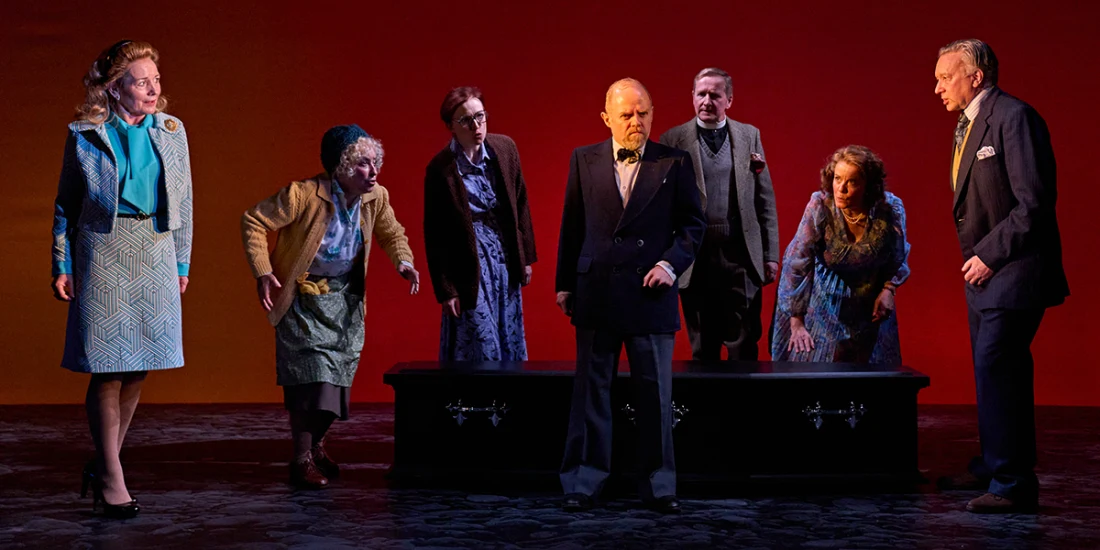'Habeas Corpus' review — Alan Bennett's farce is now a hit-and-miss comedy
Plays don't come trickier or harder to pin down tonally than Habeas Corpus, Alan Bennett's 1973 farce of sorts whose abiding topic turns out to be death. Full of jokes about outsized breasts, terminal illness, and suicidal patients who can't get seen by their doctor, this dark comedy would seem an especially odd fit for these morally scrupulous times, not least with Bennett experiencing criticism for some of his more bizarre (at times genuinely off-putting) imaginings.
In fact, as Sam Mendes proved at the Donmar in 1996, it is entirely possible to make sense of a play that has the contours of a Carry On film, within which exists really quite a bleak meditation on mortality: that production was helped no end by a dream cast headed by Jim Broadbent, Brenda Blethyn, Celia Imrie and, in the role of the domestic taken during its original run by a cross-dressing Bennett himself, Imelda Staunton. The mere thought of her mischievous way with a hoover brings a smile to my face 25 years on.
On paper, Patrick Marber would seem a logical choice to follow on all these years later from where Mendes left off. His credits, after all, include a superlative Menier revival of Travesties (which transferred to the West End and Broadway), in which this director found the beating pulse in what can often be simply a Tom Stoppard head trip. But the theatre, as we know, is an inexact science and Marber's Habeas Corpus, initially intended for the season of work that was cancelled due to lockdown, turns out to be a hit-and-miss affair. You never doubt the guiding intelligence on view, but you're equally aware of the many moments that don't land.
The defining role is Arthur Wicksteed, a serious-seeming Hove GP who thinks a lot about sex and would quite like to have more of it. His acquaintanceship with bodies is pretty extensive, as one might expect from a doctor, but not quite in the way he might wish as we are reminded by his habit of grabbing his crotch - or, as he rather grimly puts it, "this lump of suet." Appetites unrequited are the order of the day and extend to his wife Muriel (Catherine Russell, making heavy weather of a role that was made to order all those years ago for Blethyn), who happens to be generous of bosom, so to speak, and to Arthur's sister Connie (Kirsty Besterman), a heavily bespectacled spinster who yearns for the same shapely proportions with which her sister-in-law has been unfairly gifted.
Throw in the doctor's acne-plagued, spotty son Dennis (Thomas Josling, in a role originally played during the play's ill-fated Broadway run by Richard Gere), who has fallen for the same blonde, Felicity (Katie Bernstein), that has got Dennis's father hot and bothered, and you have a cat's cradle of desire, realised or not. The complex weave further includes Sir Percy Shorter (Dan Starkey), a leading medic described as "a four-foot Casanova," and Felicity's frightfully posh mum (Caroline Langrishe), who has returned from Addis Ababa and gets perhaps the best lament of the night when she exclaims: "Sex sex sex — I'm not having any!"
Presiding over affairs with a manic gleam is the cleaning lady, Mrs Swabb, who is played by musicals favourite Ria Jones, late of Sunset Boulevard amongst other titles, in her first straight play appearance. But like rather too many of her colleagues on this occasion, Jones gives the impression of a game participant in an ensemble most of whom are trying too hard, even if she does make a potentially innocent remark sound decidedly louche — "one swallow," she notes deadpan, "doesn't make a summer." All advised might be better off letting the writing speak for itself without feeling the need either to embellish it or explain it away. There are moments - as often as not involving the sweet-faced Matthew Cottle as the tellingly named, and randy, Canon Throbbing - when the prevailing sexual japery can't help but seem sleazy, which may be an indication of how much mores have changed in the half-century (almost) since the play was written.
The production gets quite a lot right. I loved the interlude acknowledging the second world war when the mood shifts exactly correctly on a dime, and Britton, a surpassingly smart actor, is a smart choice for Alec Guinness's original role as a man suspended, as he so memorably puts it, between "the living and the dying and the fishing and the frying." Langrishe aptly conveys this play's nods in the direction of both Wilde and Orton, and she's especially funny spelling out "pregnant" to listeners who seem not to recognise the word. In visual terms, the receding frames of Richard Hudson's elegantly lit set give central pride of place to a coffin - the destination toward which we are all headed. (Britton does well by Wicksteed's poignant acknowledgment of "the long littleness of life.")
Still, it seems odd for the casting to embrace diversity and then find the show's two Black actors cast in roles that are demeaning in different ways, and the mock-seriousness - a faux-grandeur in some instances - of the cast becomes wearing after a while. Think of the play as No Sex Please, We're British for Latin scholars (consider its title for starters, which is best known as a legal term) or merely a script ahead of its time with references to boosters and vaccinations that accord with Wicksteed first appearing before us wearing a mask. The characters veer from a desire for connection to a frantic insistence, appropriate to the current climate, that they not be touched. Whatever your stance on physical contact just now, this Habeas Corpus ought to be funnier than it is - and more touching, too.
Photo credit: Habeas Corpus cast (Photo by Manuel Harlan)
Originally published on
